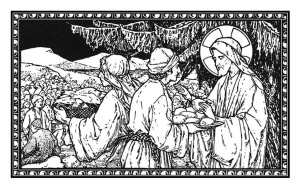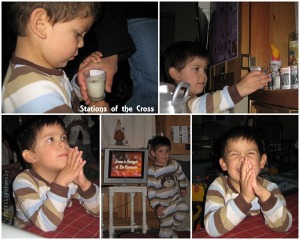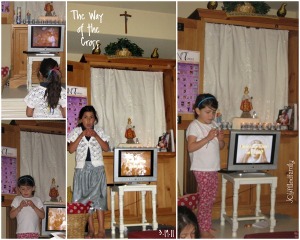Hodie, si vocem Domini audieritis, nolite obdurare corda vestra. ~ To-day if you shall hear the voice of the Lord, harden not your hearts. Ps. 42:1-2
PASSION SUNDAY
Traditional Calendar ~ Passion Sunday – New Calendar ~ Fifth Sunday in Lent
DOUBLE, FIRST CLASS / PURPLE
Jesus, eternal God, became mortal man in order to mediate our redemption, to form a new people that would be His Mystical Self, and to bring all men into an eternal union with Father, Son, and Holy Spirit. There can be no living of Christ without living the price of mediation for souls. That price may vary, from mere fidelity in the performance of monotonous duty, to bearing with loneliness and misunderstanding, or even to suffering violence and death. Sin continues, and therefore suffering for sin must continue. Since Christians share Christ’s priesthood through Baptism and Confirmation, His passion becomes their passion, for an "eternal inheritance."
~~~
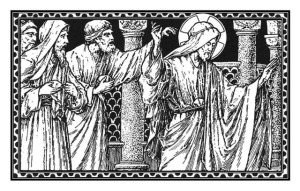 Rev. Fr. Leonard Goffine’s
Rev. Fr. Leonard Goffine’s
The Church’s Year
FIFTH SUNDAY IN LENT
( JUDICA)
….This Sunday, called Judica from the first word of the Introit, is also called Passion Sunday,
because from this day the Church occupies herself exclusively with the contemplation of the
passion and death of Christ. The pictures of Christ crucified are covered today in memory of
his having hidden Himself from the Jews until His entrance into Jerusalem, no longer showing
Himself in public. (John XI. 54.) In the Mass the Glory be to the Father, etc. is omitted,
because in the person of Christ the Holy Trinity was dishonored. The psalm Judica is not said
today, because on this day the high priests held council about our Lord, for which reason the
Church in the name of the suffering Saviour uses these words at the Introit:
INTROIT Judge me, O God, and distinguish my cause from the nation that is not holy: deliver me from the unjust and deceitful man, for Thou art my God and my strength. Send forth thy light and thy truth: they have conducted me, and brought me unto thy holy hill, and into thy tabernacles. (Ps. XLII. 1. 3.) …..
PETITION When Thine enemies calumniated Thee, most meek Jesus, Thou didst answer
them with tender words, and when they were about to stone Thee, Thou didst depart from
them, whilst we can scarcely bear a hard word, and far from yielding to our neighbor, defend
and avenge ourselves most passionately. Ah! pardon us our impatience, and grant us the grace
to bear patiently the wrongs done us, and when necessary, answer with gentleness for Thy
glory and the salvation of our neighbor.
~~~
Rev. Dom Prosper Guérange
The Liturgical Year
PASSION SUNDAY
Everything around us urges us to mourn. The images of the saints, the very crucifix on our altar, are veiled from our sight. The Church is oppressed with grief. During the first four weeks of Lent, she compassionated her Jesus fasting in the desert; His coming sufferings and crucifixion and death are what now fill her with anguish. We read in to-day’s Gospel, that the Jews threaten to stone the Son of God as a blasphemer: but His hour is not yet come. He is obliged to flee and hide Himself. It is to express this deep humiliation, that the Church veils the cross. A God hiding Himself, that He may evade the anger of men – what a mystery! Is it weakness? Is it, that He fears death? No; we shall soon see Him going out to meet His enemies: but at present He hides Himself from them, because all that had been prophesied regarding Him has not been fulfilled. Besides, His death is not to be by stoning: He is to die upon a cross, the tree of malediction, which, from that time forward, is to be the tree of life. Let us humble ourselves, as we see the Creator of heaven and earth thus obliged to hide Himself from men, who are bent on His destruction! Let us go back, in thought, to the sad day of the first sin, when Adam and Eve bid themselves because a guilty conscience told them they were naked. Jesus has come to assure us of our being pardoned, and lo! He hides Himself, not because He is naked – He that is to the saints the garb of holiness and immortality – but because He made Himself weak, that He might make us strong. Our first parents sought to hide themselves from the sight of God; Jesus hides Himself from the eye of men. But it will not be thus for ever. The day will come when sinners, from whose anger He now flees, will pray to the mountains to fall on them and shield them from His gaze; but their prayer will not be granted, and they shall see the Son of Man coming in the clouds of heaven, with much power and majesty [St. Matt. xxiv. 30].
This Sunday is called Passion Sunday, because the Church begins, on this day, to make the sufferings of our Redeemer her chief thought. It is called also, Judica, from the first word of the Introit of the Mass; and again Neomania, that is, the Sunday of the new (or the Easter) moon, because it always falls after the new moon which regulates the feast of Easter.
~~~
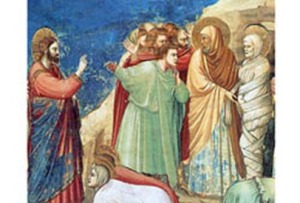
Fr. Gabriel of St. Mary Magdalen, O.C.D.
Divine Intimacy
Jesus Persecuted
Passion Sunday
Presence of God
O Jesus, help me to enter into the mystery of Your Passion; deign to associate me with it, so that I may participate in Your Resurrection.
Meditation
1. Today Passiontide begins, a time especially consecrated to the remembrance and loving contemplation of the sorrows of Jesus. The veiled crucifix and statues, the absence of the Gloria in the Mass and the Gloria Patriresponsories of the Divine Office, the suppression of the psalm Judica me at the beginning of Mass — are all signs of mourning by which the Church commemorates Our Lord’s Passion. Pope St Leo exhorts us to participate "in the Cross of Christ, in order that we also may do something which will unite us to what He has done for us, for as the Apostle says, ‘if we suffer with Him, we shall be glorified with Him.’" Therefore, we must not only meditate on Jesus’ sufferings, but also take part in them; only by bearing His Passion in our heart and in our body (cf. 2 Cor 4,10) shall we be able to share in its fruits. So it is that in the liturgy of this season the Church repeats more insistently than ever: "If you hear the voice of the Lord, harden not your hearts." The voice of the Lord makes itself hear these days, not by words, but by the eloquent testimony of deeds, by the great events of the Passion — a mystery which gives us the most convincing proof of His infinite love for us. Let us, therefore, open our heart to the sublime lessons of the Passion: let us see how much Jesus has loved us and how much we ought to love Him in return; let us learn that, if we wish to follow Him, we, too, must suffer and bear the Cross with Him and after Him. At the same time, let us open our heart to a lively hope; for our salvation is in the Passion of Jesus. In today’s Epistle (Heb 9,11-15) St Paul presents to us the majestic figure of Christ, the Eternal High Priest, who "by His Blood, entered once into the holies, [that is, heaven] having obtained eternal redemption." The Passion of Jesus has redeemed us; it has opened once again our Father’s house to us; it is then the motive for our hope.
2. The Gospel (Jn 8,46-59) narrates an instance of the pressing hostility of the Jews, an evident prelude to the Passion of Jesus. In their hardened hearts they had absolutely refused to acknowledge the mission of the Saviour; as a result, they schemed in a thousand ways to oppose His teachings and to belittle Him before the people by declaring Him a liar and one possessed by the devil. Their animosity had increased to the point where they decided to stone Him: "They took up stones therefore to cast at Him." Jesus’ death was already decreed by the Jews, but the hour fixed by His Father had not yet come, so "Jesus hid Himself, and went out of the Temple."
This passage in the Gospel allows us to consider the conduct of Jesus in the presence of His persecutors: we see zeal for their souls, meekness, personal disinteredeness, and total abandonment to God. St Gregory the Great wrote: "Consider, beloved brethren, the meekness of the Lord. He, who had come to remit sins, said, ‘Which of you will convince Me of sin?’ He, who by virtue of His divinity, could justify sinners, does not disdain to prove by reasoning that He is not a sinner."
The calumnies continued: "Thou art a Samaritan and hast a devil." The divine Master answered, always with meekness, only what was necessary to testify to the truth: "I have not a devil, but I honour My Father, and you have dishonoured Me." Then He placed His reputation and His cause in the hands of God. "I seek not My own glory; there is One that seeketh and judgeth." In the meantime, throughout all the discussions, He did not cease to instruct and to enlighten minds, attempting to draw them away from error. Always forgetful of Himself, He though only of the good of souls. It was precisely in these painful circumstances that Jesus gave us precious instruction: "He that is of God, heareth the words of God…. If any man keep My word, he shall not see death forever." Let us gather these lessons from the lips of our persecuted Master, and keep them in our heart with a jealous care. In our day, too, the world is filled with His enemies, those who oppose His doctrine and despise His Passion. Let us, at least, believe in Him and be His faithful friends.
Colloquy
"Praise be to You, O most merciful God, who willed to redeem us and restore us by the Passion, the sufferings, the scorn, and the poverty of Your Son, when we were wretched outcasts and condemned prisoners. I run to Your Cross, O Christ — to suffering, scorn, and poverty; with all my strength I desire to be transformed in You, O suffering God-Man, who loved me so much that You endured a horrible, shameful death for the sole purpose of saving me, and to give me an example, so that I would be able to endure adversity for love of You. It is the perfection and true proof of love to conform myself to You, O Crucified One, who for my sins willed to undergo a cruel death, delivering Yourself entirely to tortures, as a victim. O my suffering God, only by reading the book of Your life and death shall I be able to know You and to penetrate Your mystery. Grant me, then, a profound spirit of pray, a pious, humble, attentive prayer, springing not only from my lips, but also from my heart and soul, so that I shall be able to understand the lessons of Your Passion!
"In this book, I see Your infinite goodness and mercy, which made You take upon Yourself our condemnation, our scorn, our sufferings, rather than leave us in such a wretched state. I see the unlimited bounty, the care, the diligence You showed to save us and lead us back to the heavenly kingdom. I see the infinite wisdom by which You redeemed us, saved us, and glorified us in an ineffable manner, through Your mercy, without harming Your justice. While You died a painful death, You vivified everything and destroyed that death common to us all.
"Yet more, in the book of Your Cross I see Your infinite meekness, by which, although being cursed, You did not curse nor avenge Yourself, but on the contrary, You pardoned and won heaven for the very ones who were crucifying You" (St Angela of Foligno).
Resources
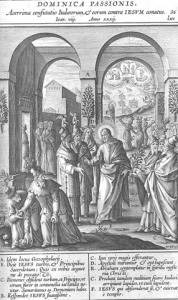
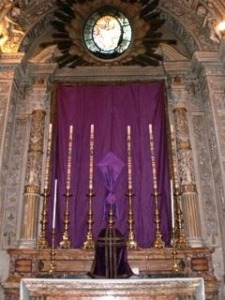
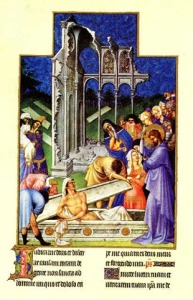
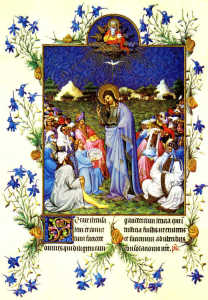 FOURTH SUNDAY IN LENT
FOURTH SUNDAY IN LENT ![[IMG_6546.jpg]](https://joyfilledfamily.com/wp-content/uploads/2011/04/IMG_6546-239x300.jpg)
